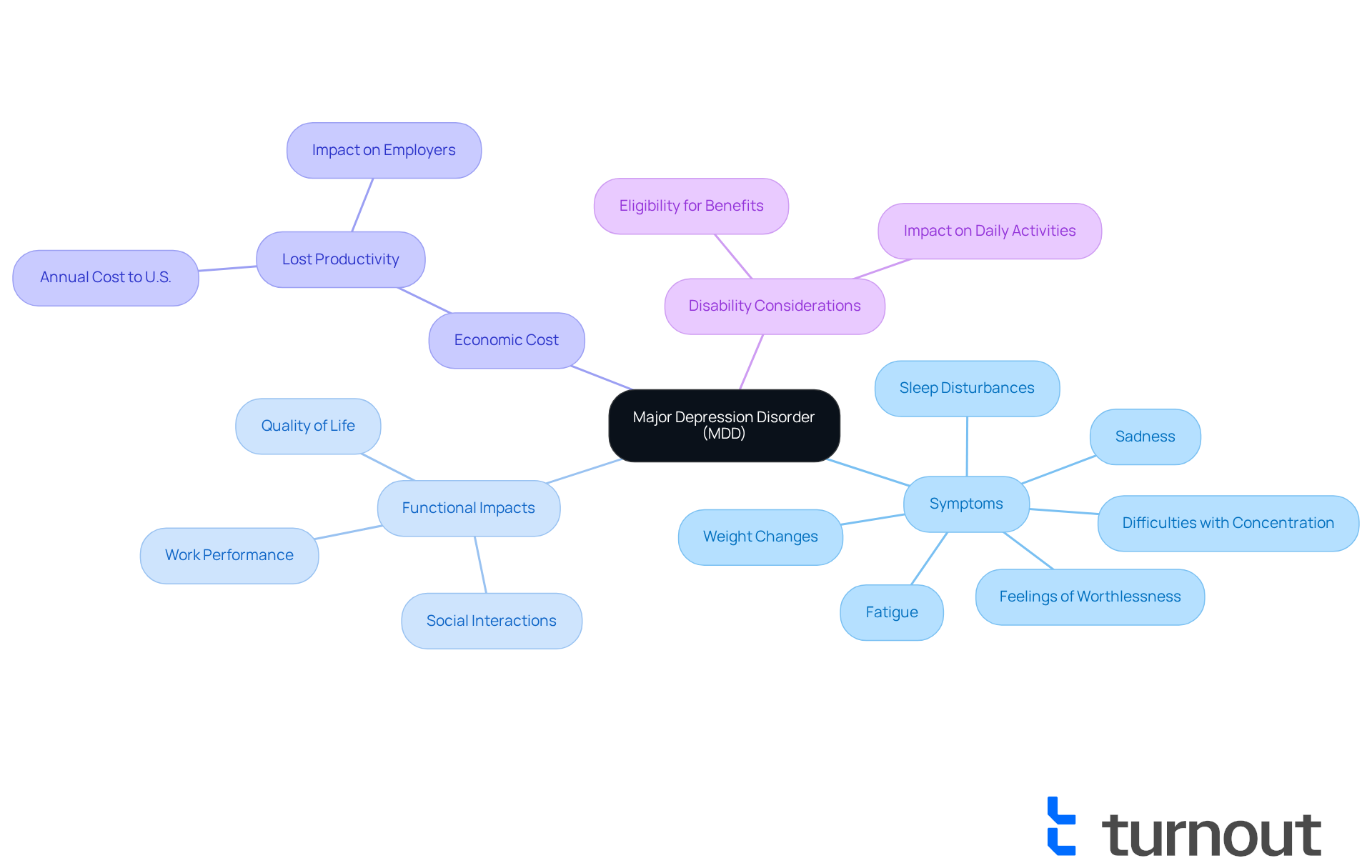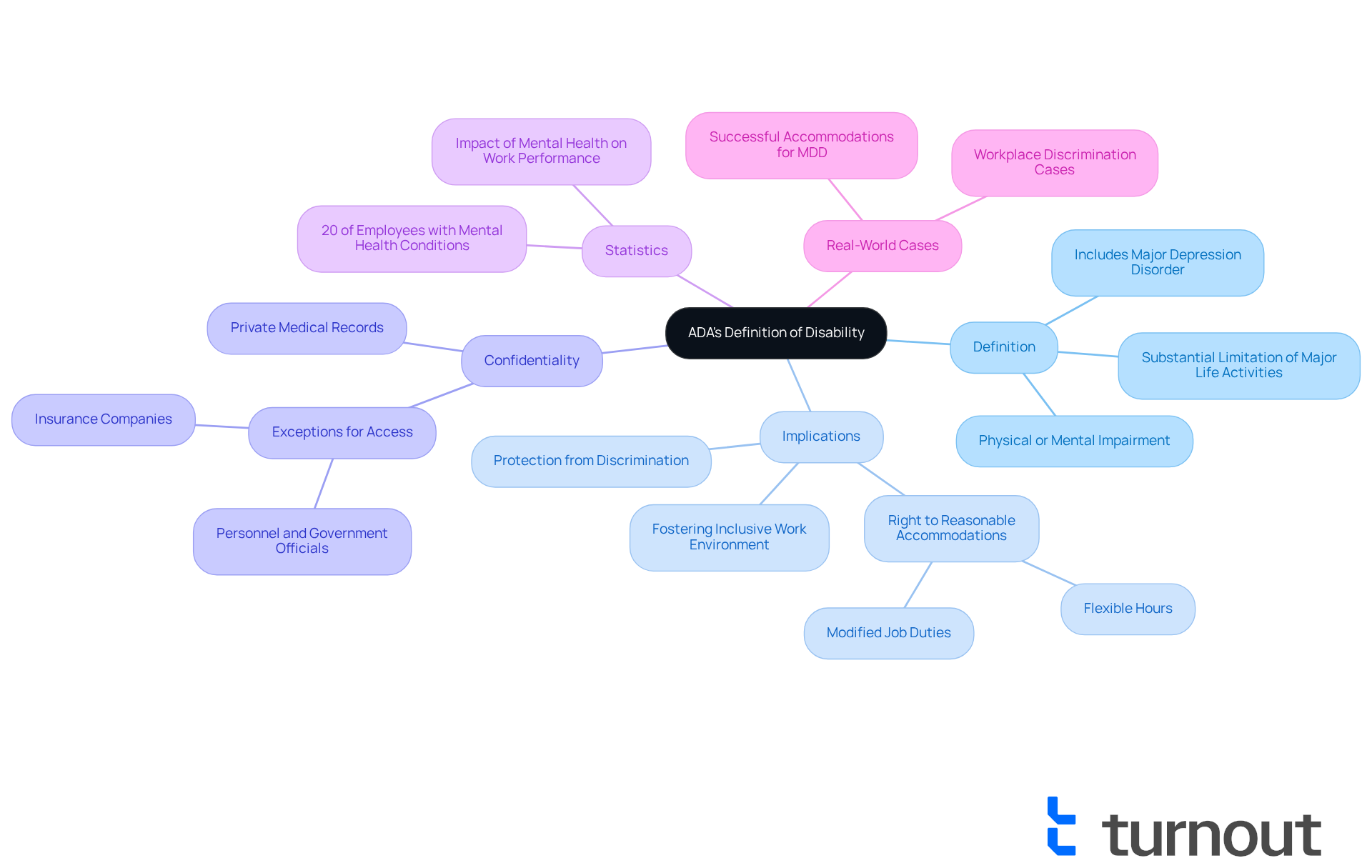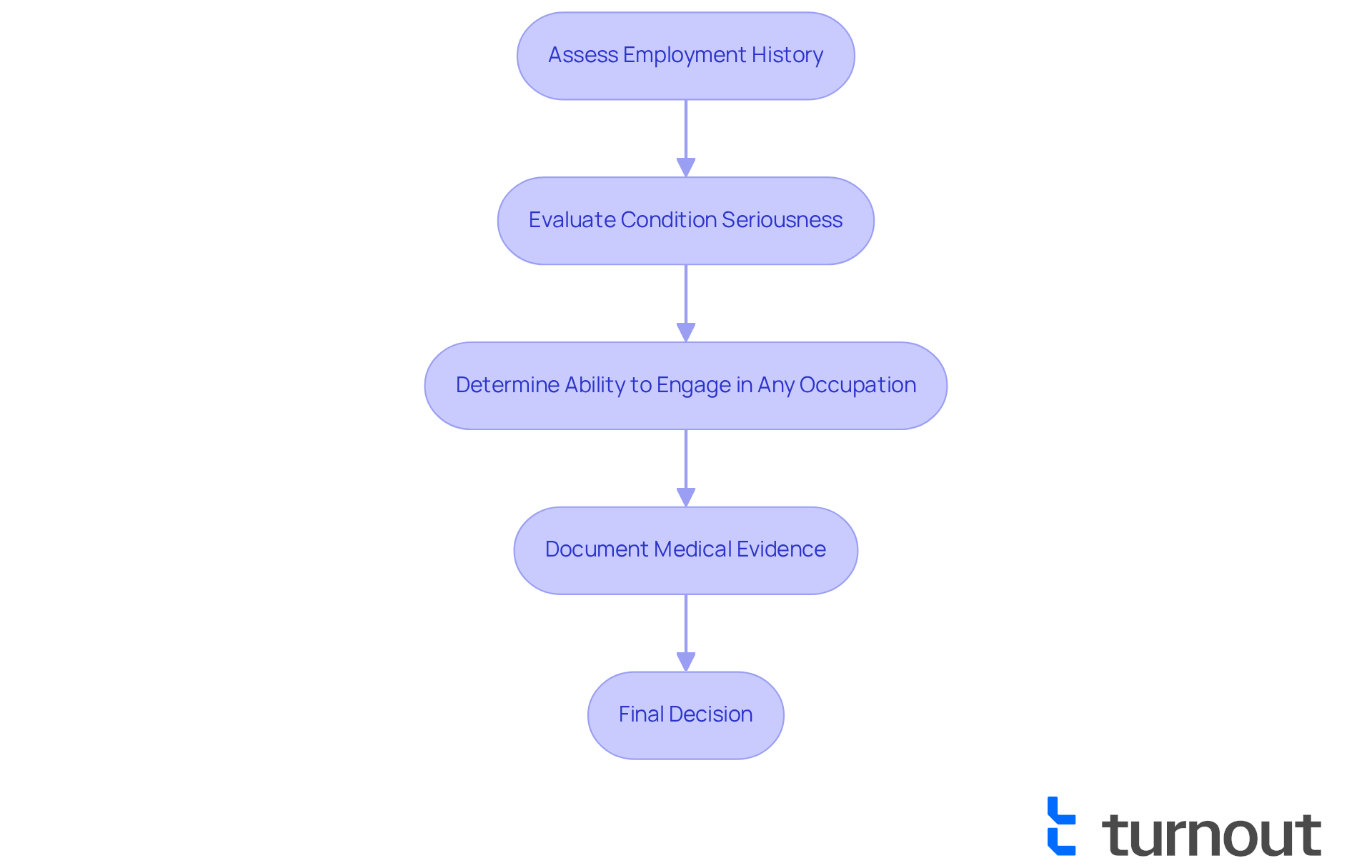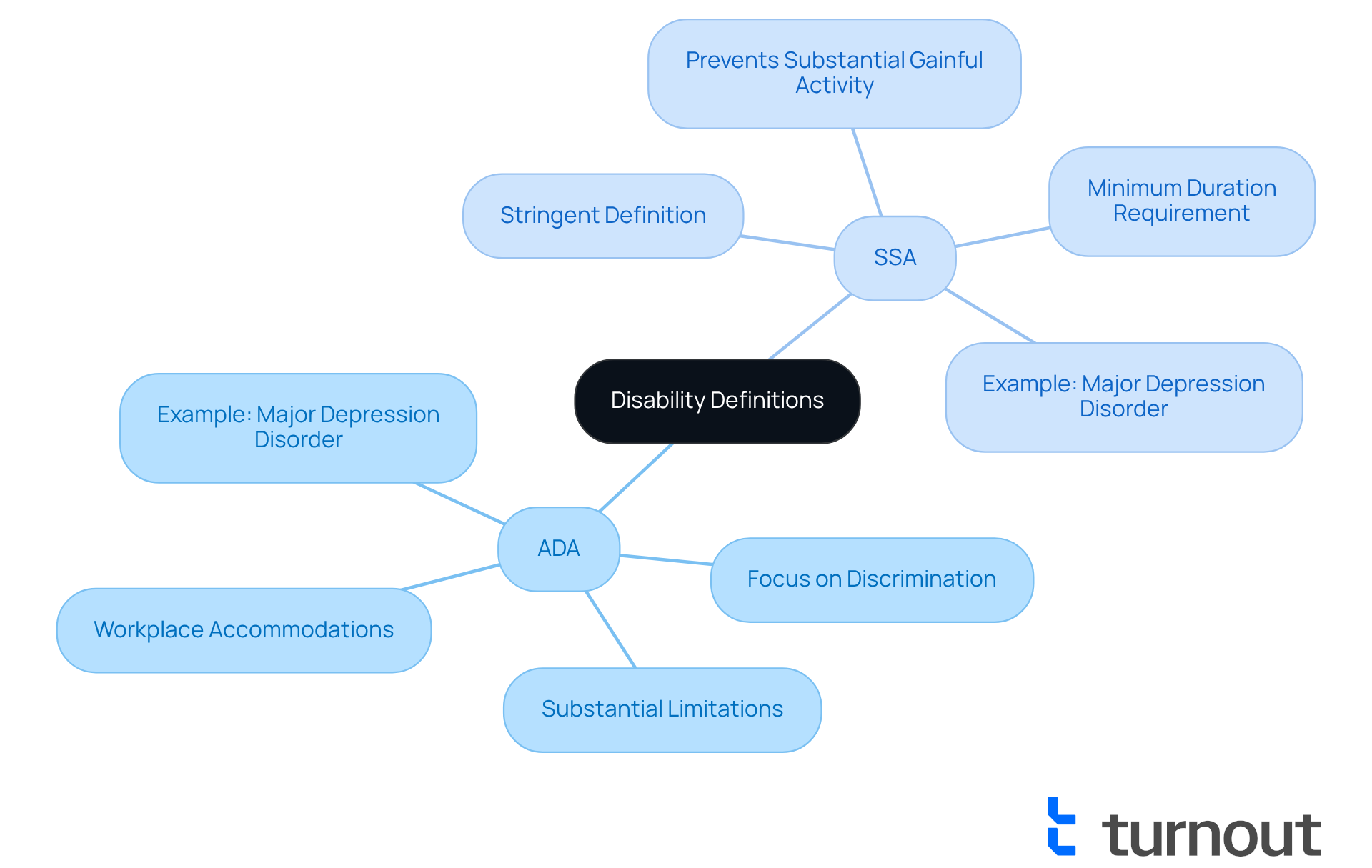Overview
Major Depression Disorder (MDD) can indeed be classified as a disability under both the Americans with Disabilities Act (ADA) and the Social Security Administration (SSA). However, it’s important to recognize that the criteria and implications differ significantly between the two.
We understand that navigating these classifications can be overwhelming. The ADA offers protections against discrimination and requires reasonable accommodations for individuals with MDD if it substantially limits their major life activities. This means that support is available to help you manage your daily life.
On the other hand, the SSA necessitates evidence that MDD prevents substantial gainful activity for at least 12 months to qualify for financial benefits. This highlights the complexities involved in pursuing disability claims related to mental health. Remember, you are not alone in this journey; there are resources and support systems in place to assist you every step of the way.
Introduction
Major Depression Disorder (MDD) presents significant challenges for individuals, often leading to profound impacts on daily functioning and work performance. We understand that this condition affects millions, and it’s essential to explore whether MDD qualifies as a disability under the Americans with Disabilities Act (ADA) and the Social Security Administration (SSA). This exploration reveals the complexities of navigating disability definitions, raising critical questions about eligibility and the rights of individuals with mental health conditions.
It's common to feel overwhelmed by these questions:
- How do these two frameworks differ?
- What does it mean for those grappling with the realities of major depression?
Understanding these aspects is crucial for anyone seeking support. Remember, you are not alone in this journey, and we're here to help you navigate these challenges.
Define Major Depression Disorder and Its Impact on Functionality
Major Depression Disorder (MDD), often known as clinical depression, is characterized by persistent feelings of sadness, hopelessness, and a reduced interest in most activities. Symptoms typically include significant weight changes, sleep disturbances, fatigue, feelings of worthlessness, and difficulties with concentration. These challenges can severely impact daily functioning, affecting work performance, social interactions, and overall quality of life. The consequences of MDD raise the question of whether major depression disorder is a disability, as it can lead to considerable limitations in major life activities, making it a pressing concern for individuals seeking disability benefits.
We understand that those facing MDD often struggle with maintaining steady employment due to cognitive impairments, including issues with concentration and decision-making. In fact, statistics show that 77.1% of workers with depression report lost productive time at work, highlighting the functional impairments tied to this condition. When evaluating eligibility for assistance under both the Americans with Disabilities Act (ADA) and the Social Security Administration (SSA) frameworks, it is important to consider whether major depression disorder is a disability, as this impairment directly impacts a person's capacity to engage in meaningful gainful activity.
Recent studies reveal that major depression is a leading cause of disability globally, with significant repercussions for workplace productivity. The economic impact of depression is estimated to cost the U.S. between $36.6 and $51.5 billion annually due to lost productivity. Real-world experiences illustrate the hurdles faced by individuals with MDD; many express feeling overwhelmed by daily tasks, resulting in absenteeism and presenteeism, which complicates their employment situation further. Addressing these challenges is vital for enhancing the quality of life for those affected by MDD and ensuring they receive the necessary support to navigate their circumstances.
Turnout provides access to tools and services that help individuals understand their eligibility for SSD claims and navigate the complexities of financial assistance without needing legal support. It’s important to clarify that Turnout is not a law firm and does not offer legal advice; rather, they employ trained nonlawyer advocates to assist clients in understanding their options. As Brené Brown wisely states, 'You are enough just as you are.' This serves as a reminder that individuals experiencing MDD deserve compassion and understanding as they seek help.

Examine ADA's Definition of Disability and Its Implications
The Americans with Disabilities Act (ADA) defines a disability as a physical or mental impairment that substantially limits one or more major life activities. This broad definition includes various conditions, one of which is major depression disorder a disability (MDD). Under the ADA, individuals with MDD may be eligible for reasonable adjustments in their employment, like flexible hours or modified job duties. These accommodations can significantly enhance their ability to perform effectively.
The implications of this definition are profound. If an employee with MDD can demonstrate that their condition significantly restricts their job capabilities, they may need to consider if is major depression disorder a disability, which provides them protection from discrimination and the right to adjustments that support their success in the workplace. This legal framework is essential for fostering an inclusive work environment, ensuring that individuals with mental health conditions are treated fairly and equitably.
Confidentiality is a critical aspect of the ADA. It mandates that any information regarding a person's impairment be treated as private medical records, separate from other employee files. However, exceptions exist, allowing certain personnel, government officials, and insurance companies access to relevant information under specific circumstances.
Statistics reveal that approximately 20% of current employees are living with a mental health condition. This highlights the importance of understanding and applying accommodations. Recent cases have shown that employees with MDD have successfully secured reasonable accommodations. This reinforces the need for organizations to recognize and proactively address mental health needs. Furthermore, workplace discrimination cases related to MDD under the ADA underscore the ongoing challenges faced by individuals, emphasizing the necessity for continued advocacy and support in the workplace.

Analyze SSA's Definition of Disability and Eligibility Criteria
The Social Security Administration (SSA) understands that navigating the world of disability can be overwhelming, particularly when considering if major depression disorder is a disability. Disability is defined as the inability to engage in substantial gainful activity due to a medically determinable physical or mental impairment. For individuals with MDD, it is crucial to assess if major depression disorder is a disability that significantly restricts their ability to perform essential job activities.
To assess whether major depression disorder is a disability that qualifies for Social Security Disability Insurance (SSDI) or Supplemental Security Income (SSI), applicants need to provide medical evidence showing that their MDD has persisted, or is expected to persist, for at least 12 months. This documentation should detail how the disorder severely limits their ability to engage in employment. It is helpful to include accounts from healthcare providers about the severity of symptoms, treatment history, and the impact of MDD on daily functioning.
The SSA employs a five-step procedure to assess claims. This process evaluates the applicant's employment history, the seriousness of their condition, and their ability to engage in any occupation available in the national economy. It’s common to feel discouraged, as recent statistics indicate that more than half of initial claims for Social Security disability benefits are denied. This highlights the importance of thorough and comprehensive medical documentation to enhance the chances of approval.
Successful claims often hinge on demonstrating how MDD relates to the question of whether major depression disorder is a disability that affects daily life and job capabilities. Individuals who have effectively documented their treatment history and the functional limitations resulting from their condition tend to have higher approval rates. Experts emphasize that the SSA's criteria for MDD raise the question of whether major depression disorder is a disability, necessitating a clear demonstration of how the disorder impedes daily activities and work performance. This reinforces the need for meticulous preparation when submitting claims.
Remember, you are not alone in this journey. We're here to help guide you through the process and ensure that your voice is heard. Taking the time to gather the right documentation can make a significant difference in your claim's success.

Compare and Contrast ADA and SSA Definitions of Disability
The Americans with Disabilities Act (ADA) and the [Social Security Administration](https://myturnout.com/service/tax-relief-resolution) (SSA) both seek to safeguard individuals with disabilities, but their definitions and implications can feel quite different. The ADA is primarily focused on preventing discrimination and ensuring reasonable accommodations in the workplace. It defines disability based on substantial limitations on major life activities. On the other hand, the SSA's definition is more stringent. It requires that the impairment not only prevents substantial gainful activity but also lasts for a minimum duration, typically 12 months or more.
For example, consider someone diagnosed with Major Depression Disorder (MDD) as we explore the question of is major depression disorder a disability. They may qualify for protections under the ADA if their condition significantly restricts their ability to work, which leads to the inquiry of whether is major depression disorder a disability, even if they can still perform some job functions. However, to qualify for benefits under the SSA, this individual must provide evidence that raises the question of whether major depression disorder is a disability that prevents them from engaging in any substantial gainful activity. This often necessitates comprehensive medical documentation and a longer duration of impairment.
This distinction is crucial for those navigating the complexities of disability claims. It directly affects eligibility for workplace accommodations versus financial support. We understand that this process can be overwhelming. Statistics show that only about one-third of SSDI applicants are awarded benefits after the entire application and appeal process, highlighting the challenges faced by those seeking SSA support. By understanding these differences, you can empower yourself to make informed decisions about your rights and the resources available to you. Remember, you are not alone in this journey, and we’re here to help.

Conclusion
Major Depression Disorder (MDD) presents significant challenges that can deeply affect your daily life and ability to work. We understand that navigating whether MDD qualifies as a disability under the Americans with Disabilities Act (ADA) and the Social Security Administration (SSA) can be daunting. These frameworks aim to protect individuals with disabilities, but they define and approach disability differently. This distinction is crucial for those seeking support and accommodations.
The ADA focuses on:
- Preventing discrimination
- Ensuring reasonable accommodations in the workplace for those whose MDD significantly limits their ability to perform major life activities.
In contrast, the SSA requires a more stringent evaluation, necessitating medical documentation to prove that MDD hinders substantial gainful activity for a minimum duration. Recognizing this difference is vital for individuals seeking either workplace protections or financial assistance, as the processes and requirements vary significantly.
Ultimately, it is essential to acknowledge the complexities surrounding Major Depression Disorder and its classification as a disability. You are not alone in facing these challenges. We encourage you to seek the support you need, whether through workplace accommodations or disability benefits. Understanding the nuances of both the ADA and SSA can empower you to make informed decisions and ensure you receive the necessary assistance to enhance your quality of life and navigate your circumstances effectively.
Frequently Asked Questions
What is Major Depression Disorder (MDD)?
Major Depression Disorder (MDD), also known as clinical depression, is characterized by persistent feelings of sadness, hopelessness, and a reduced interest in most activities. Symptoms may include significant weight changes, sleep disturbances, fatigue, feelings of worthlessness, and difficulties with concentration.
How does MDD impact daily functioning?
MDD can severely impact daily functioning, affecting work performance, social interactions, and overall quality of life. Individuals with MDD often struggle with maintaining steady employment due to cognitive impairments, including issues with concentration and decision-making.
Is Major Depression Disorder considered a disability?
Yes, MDD can be considered a disability as it leads to considerable limitations in major life activities. This is particularly relevant for individuals seeking disability benefits under frameworks like the Americans with Disabilities Act (ADA) and the Social Security Administration (SSA).
What are the statistics regarding productivity loss due to depression?
Statistics indicate that 77.1% of workers with depression report lost productive time at work, highlighting the functional impairments associated with this condition. The economic impact of depression in the U.S. is estimated to cost between $36.6 and $51.5 billion annually due to lost productivity.
What challenges do individuals with MDD face in the workplace?
Individuals with MDD often feel overwhelmed by daily tasks, which can lead to absenteeism and presenteeism, further complicating their employment situation.
How can Turnout assist individuals with MDD regarding disability claims?
Turnout provides access to tools and services that help individuals understand their eligibility for Social Security Disability (SSD) claims and navigate financial assistance complexities. They employ trained nonlawyer advocates to assist clients in understanding their options, but they do not offer legal advice.
What is the importance of compassion for individuals experiencing MDD?
Individuals experiencing MDD deserve compassion and understanding as they seek help. Recognizing their challenges and supporting them is vital for enhancing their quality of life.




